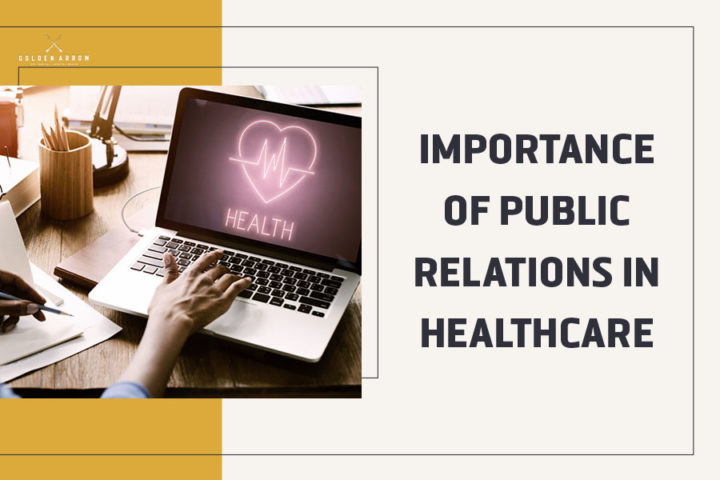Every organization has a reputation and an image built over time through its work and employees’ ethics. Companies, including healthcare organizations, also want to maintain their good reputation. No wonder the importance of public relations in healthcare is at a high level.
So, we will highlight the importance of public relations in the healthcare sector. We will also emphasize PR’s benefits to medical facilities, patients, and public health. Read on to learn everything you need to know about the PR’s value in the healthcare sector!
Importance of Public Relations in Healthcare
As an experienced PR agency, we know that healthcare organizations need public relations (PR) professionals to maintain a good image in the eyes of the public. Healthcare PR is a smart way to manage a company’s image. So, we consider a successful healthcare PR when the image is an asset to the company.
However, healthcare organizations are very competitive. That is why PR in healthcare is very important for them. Knowing this, we focus on helping startups and establish healthcare brands. While there are many reasons why PR is vital, we have enlisted the key benefits of public relations in the healthcare sector.

Trust building and credibility
One of the main benefits of PR for healthcare is trust building and credibility. They are the basis of the healthcare sector. They are essential for the organization’s success and patient satisfaction. Our PR professionals can do a lot to make people trust an organization.
Simply put, as a healthcare PR company, we share the news with people inside and outside the organization. Also, our PR professionals manage the communication between stakeholders, like customers, investors, and suppliers. So, clear and timely communication creates trust among the parties involved.
Moreover, our healthcare PR experts work on the representation of healthcare organizations at conferences, the contribution to reputable publications, and partnering with influencers in the medical field. All these should enhance credibility and attract patients.
Effective communication
Another important aspect of public relations in healthcare is facilitating effective communication. Healthcare organizations need to effectively communicate with various stakeholders, including patients, employees, government agencies, and the general public.
Clear communication helps avoid misunderstandings, resolve conflicts, and ensure accurate information. Hence, our PR professionals in the healthcare sector play an important role in choosing the right communication strategies, like press releases, social media campaigns, or internal communication.
Crisis management
Our healthcare PR teams are crucial in managing and mitigating potential crises or negative situations. Healthcare organizations may face medical errors, data breaches, lawsuits, negative media coverage, etc.
Therefore, our PR professionals work on crisis communication plans and guide stakeholders through these events. Plus, they handle media inquiries during crises. A successful PR team should analyze the problems and react calmly and quickly. Then, the team should assess the damage and prepare an action plan.
Their goal is to protect the organization’s reputation, mitigate any potential negative impact on patients, and rebuild stakeholder trust.
Reputation management
A positive reputation is very important for healthcare organizations. The role of public relations companies is to create and maintain a good image in the eyes of all stakeholders.
That is why our PR professionals work on highlighting the organizations’ achievements and expertise. They know how important it is to maintain a good relationship with the media. A good reputation attracts new patients and employees and makes an organization trustworthy.
As a healthcare PR company, we know that we should ensure that the media records are in favor of the organization. Only this way the reputation will remain good for a long time.

Patient and community management
As a PR company, we are responsible for managing relationships with patients and the community. Our PR professionals work on promoting health and wellness initiatives.
Our PR company shares accurate information to encourage patients to make informed decisions about their healthcare options. Our PR efforts also focus on building community trust and making communication between the community and healthcare organizations easier.
Additionally, the community’s perception of a healthcare organization influences its reputation. That is why our PR experts ensure the community has access to health education programs. People must know what are their health risks and available preventive measures.
Ethical considerations
Nowadays, the promotion of healthcare institutions is considered ethical as long as the information they share is honest, truthful, and non-discriminatory. So, we aim to share clear and transparent information. They must follow professional codes of conduct and respect ethical standards.
Since healthcare involves sensitive information, PR professionals must resolve complex ethical situations. They must maintain patients’ privacy and confidentiality. But at the same time, they promote an organization’s mission and values.
Public policy and advocacy
PR experts collaborate with governmental agencies, policymakers, and other stakeholders since they advocate for better health results and address public health concerns.
Our PR professionals influence public opinion and drive positive change through communication campaigns. Their effort is vital in raising awareness about finding solutions for health issues.
Measuring the Impact of Healthcare PR
The impact of healthcare public relations can be measured with several key performance indicators (KPIs). Here are some of the indicators:
Key performance indicators
Media coverage
Measuring the number and quality of media mentions is important. It shows the PR efforts and increases the media presence of a healthcare organization. Plus, media coverage may show how the relationship between healthcare PR and journalists is progressing.
Social media engagement
Social media engagement can be seen through likes, comments, shares, and follows. Those are social media metrics and show how much interest the PR content has generated.
Website traffic
Analyzing website traffic data can help determine whether PR efforts are showing results. They are successful if the website drives traffic.
Brand sentiment
This metric allows you to see whether positive or negative associations relate to an organization. This can be seen in online mentions and conversations about a healthcare organization.
Patient satisfaction
You can measure patient satisfaction through surveys and feedback. Their analysis can help assess the impact of PR efforts on improving the reputation of an organization.
PR analytics landscape in healthcare
The PR landscape is constantly evolving. This is due to technological advancements and changes in consumer behavior. Some of the changes and trends in PR are:
Increased focus on digital channels
Social media and digital channels’ popularity made organizations focus on them. So, as a PR agency, we focus on building brand awareness and engagement through these channels. Those include influencer and content marketing and targeted digital advertising.
More emphasis on storytelling
There are many healthcare organizations on the market. To stand out from the crowd, an organization must show its uniqueness. Hence, we also use storytelling. That way, we build stronger relationships with the public.
The Future of Healthcare PR
The future of healthcare PR involves artificial intelligence, virtual reality, chatbots, and voice assistants.
Emerging trends and technologies in healthcare PR
Artificial intelligence
We are aware that AI tools may help our PR team analyze large amounts of data, identify trends, and predict the impact of PR campaigns.
Virtual reality
This technology can potentially revolutionize healthcare PR by providing an interactive experience. For example, VR can showcase medical advancements, simulate patient experience, and more.
Chatbots and voice assistants
These AI tools are increasingly used to provide customer support and answer frequently asked questions. This improves the PR experience for patients and stakeholders.
The role of social media and digital PR
Social media and digital PR build brand awareness. Social media platforms are invaluable in the public relations world. They connect the public with healthcare organizations.
Influencer marketing is another popular and powerful tool. Social media influencers with credibility and many followers might be great partners in healthcare PR campaigns. Plus, social media platforms allow healthcare organizations to engage with patients directly, answer questions, provide support, and share testimonials.
Potential challenges for healthcare PR
The challenges for healthcare PR include:
- Privacy and security concerns – Digital PR strategies involve technologies that require patient data. So, all PR professionals should focus on patients’ privacy.
- Managing misinformation – With the rapid flow of information on social media, we are aware that our healthcare PR teams must work on addressing misinformation quickly.
Potential opportunities for healthcare PR
The opportunities for healthcare PR include:
- Personalization and customization – The future of healthcare PR is in personalized communication that suits everyone’s needs. PR professionals will need to use technology to deliver tailored messages.
- Collaboration and integration – Integrating PR with other departments, such as marketing, communications, and digital teams, will be essential.

Conclusion
The importance of public relations in healthcare is undeniable. Effective PR strategies allow healthcare organizations to manage crises, build and maintain a positive reputation, communicate with patients and communities, etc.
Also, there are several key performance indicators to measure the impact of healthcare PR. Those include media coverage, social media engagement, website traffic, brand sentiment, and patient satisfaction.
So, the future of healthcare PR lies in artificial intelligence, virtual reality, and voice assistants. Social media and digital PR also play an important role in the medical industry. However, healthcare PR must face certain challenges. Yet, the future also holds new opportunities for this sector.


